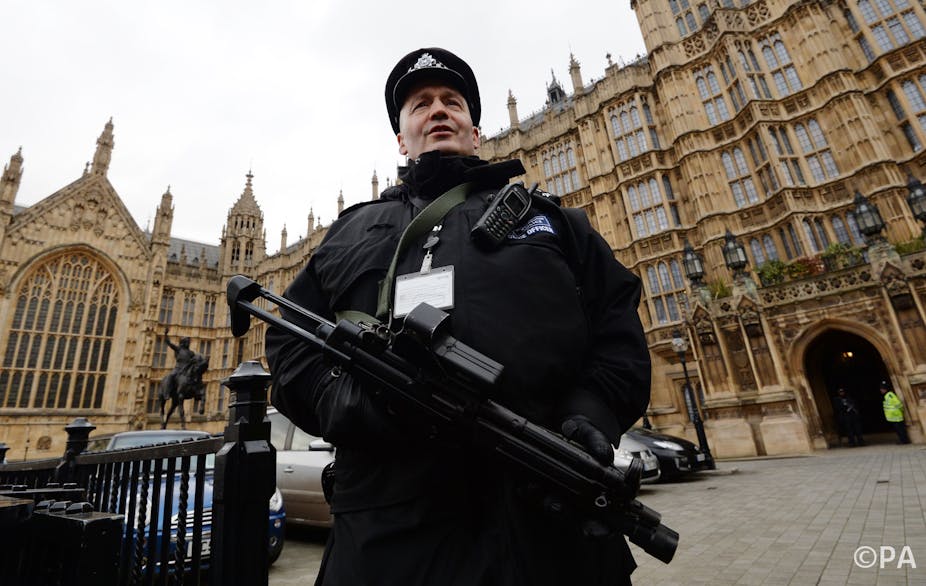The new Counter-Terrorism and Security Act 2015 received Royal Assent at a turbulent historical moment. The naming of University of Westminster graduate Mohammed Emwazi as the man seen in Islamic State videos involving the beheading of hostages has again focused political attention on radicalisation and free speech in universities.
Following recent attacks in Paris and Copenhagen, concerns about the numbers of young British citizens travelling to join the Islamic State in the Middle East, and the trial of Brusthom Ziamani – a British teenager found guilty of preparing an act of terrorism – are all events likely to influence public reception of the new legislation.
The passing of the act into statute on February 12 makes it the sixth addition to a suite of counter-terrorism legislation established since the 2000 Terrorism Act. It permits the home secretary powers to block the movements of British citizens in and out of the UK if they are suspected of having engaged in terrorism-related activities, forbids insurance companies to pay ransom demands from terrorist organisations and extends the use of Terrorism Prevention and Investigation Measures.
Perhaps the most controversial aspect of the act relates to the formalisation of elements of the British government’s PREVENT strategy into law. The new act puts the responsibility on “specified authorities” to “prevent people from being drawn into terrorism”. While seemingly apt for some organisations such as the police, for others, such as health and social care institutions, schools and universities, it constitutes a fundamental change in role that affects the ethos and fabric of our civic institutions.
Many people working in the public organisations affected by the new proposals may be feeling justifiably uneasy given the deleterious effects on community relations that several PREVENT initiatives – such as the Channel Project, aimed at preventing people being drawn into extremism – have produced.
Security creep
The inclusion of higher education institutions within the act has been opposed on many fronts ranging from university students and the University and College Union, to the former director general of MI5, Baroness Manningham-Buller. Much of this opposition was directed towards the threat that these proposals pose to academic freedom.
One of the objectives of universities is to foster the critical thinking necessary to create positive social change. In many social science disciplines this involves debating thorny issues and, when necessary, contesting the impacts and effects of powers and laws. For example, several of the counter-terrorism powers dropped or reconstituted by the present coalition government – including Section 44 stop and search powers and control orders – had been subject to longstanding critique by not only human rights groups but also by sociologists, criminologists and legal scholars.
Although extremism is not explicitly defined in the act, PREVENT duty guidance – sent out for consultation in 2014 – defines extremism as “vocal or active opposition to British values, including democracy, the rule of law, including liberty and mutual respect and tolerance of different faiths and beliefs”. It is easy to see how necessary opposition to draconian counter-terrorism measures might – given the stretchiness of the definition above – be misconstrued as extremism.
No particular communities are identified as being at risk from being “drawn into terrorism”. Yet the emphasis placed within the PREVENT agenda on Muslim individuals and communities defined as being vulnerable to “radicalisation” is a cause of concern. Despite its frequent appearance in security policy, “radicalisation” remains ill-defined and broadly misinterpreted
Defending academic freedom
The initial scope of the new act was curtailed at the bill stage by amendments from the House of Lords limiting its applicability to higher education. This instructed that authorities and the secretary of state “must have particular regard to the duty to ensure freedom of speech” and “particular regard to the importance of academic freedom”.

Despite this, there are many reasons why we should remain concerned about the new powers that have been granted. These proposals ought to have been removed completely in the interests of fully protecting the academic freedom enshrined in law under the 1986 Education Act and maintaining trust between teachers and students, as the Joint Committee on Human Rights recommended. It should be remembered too that teaching staff in further and higher education institutions already have guidance at their disposal from Universities UK to combat “political or religious extremism” and to assist in “preventing extremism”.
Notwithstanding the creep of security priorities into higher education, the elastic use of the term “freedom of speech” in current political and media debates is disquieting. Individuals that live in “suspect communities” may feel that their freedom of speech is already closely monitored and, in some instances, curtailed. For others, the right to free speech can be mobilised in defence of incendiary statements about race, religion and culture. With free speech comes social responsibility. In what we say, write and represent, we need to fully consider the potentially negative impacts on our fellow citizens.
There is a clear danger that the scope of the powers now enshrined in law to defend “security” threaten the very values of open democracy. Considering a future context in which dissenting voices may be categorised as extremist, we really need to challenge and rebut ill-conceived measures while we still can.
The Conversation is partnering with Index on Censorship for its special edition on academic freedom. Read more here.

